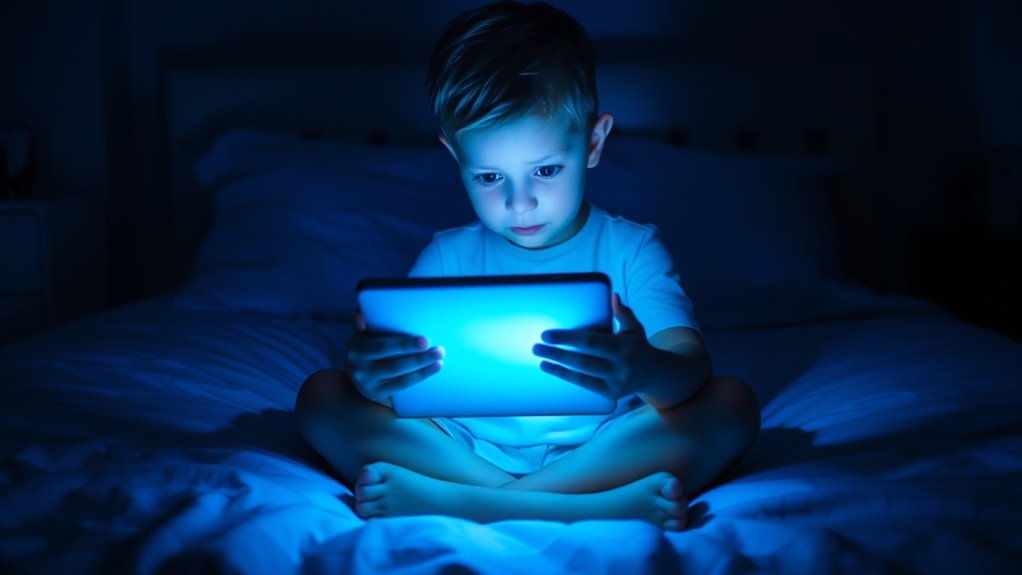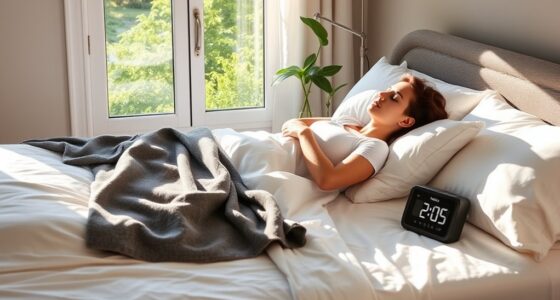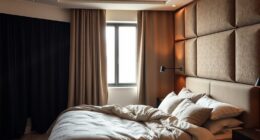Excessive screen time and blue light exposure can disrupt your child’s sleep by interfering with their natural circadian rhythm and suppressing melatonin production. This makes it harder for them to fall asleep, leads to fragmented sleep, and increases daytime drowsiness and mood swings. If you want to help your child sleep better and wake refreshed, it’s important to limit screens before bedtime and create a calming sleep environment. Keep exploring how to improve their sleep health for lasting benefits.
Key Takeaways
- Blue light from screens delays sleep onset by disrupting the circadian rhythm and suppressing melatonin production in children.
- Excess screen time before bed increases sleep fragmentation, leading to shorter and poorer quality sleep.
- Sleep disturbances caused by blue light exposure contribute to daytime drowsiness, irritability, and decreased concentration.
- Limiting screen use an hour before bedtime and using blue light filters can help improve children’s sleep quality.
- Establishing screen-free bedtime routines supports healthier sleep patterns and overall well-being in children.

Many children spend significant time looking at screens, and this exposure to blue light can disrupt their sleep patterns. When your child uses devices like tablets, smartphones, or computers before bed, the blue light emitted can interfere with their natural sleep cycle. This disruption primarily happens because blue light affects the circadian rhythm, which is your child’s internal clock that regulates sleep and wakefulness. The circadian disruption caused by blue light can make it harder for children to fall asleep at night and wake up refreshed in the morning.
Blue light from screens can disrupt children’s sleep patterns and circadian rhythms.
One of the key ways blue light impacts sleep is through melatonin suppression. Melatonin is a hormone that your child’s body produces naturally in response to darkness, signaling that it’s time to sleep. When blue light floods their eyes, it tricks the brain into thinking it’s still daytime, reducing melatonin production. This suppression delays the onset of sleep, leading to shorter sleep duration and poorer sleep quality. Over time, consistent exposure to blue light during evening hours can cause your child to develop a misaligned circadian rhythm, making it increasingly difficult for them to fall asleep naturally.
The consequences of circadian disruption and melatonin suppression are significant. Not only does your child struggle to fall asleep, but they may also experience fragmented sleep, waking up frequently during the night. This can cause daytime drowsiness, decreased concentration, and irritability. Sleep deprivation can impair their academic performance, mood, and overall health. The longer blue light exposure continues, the more entrenched these sleep problems can become, leading to chronic sleep issues that extend into adolescence and adulthood.
To help mitigate these effects, you should limit your child’s screen time at least an hour before bedtime. Creating a relaxing, screen-free routine signals to their body that it’s time to wind down. Encourage activities like reading a book, listening to calming music, or engaging in gentle stretching. Additionally, consider using blue light filters or glasses that block blue light on their devices if screen use is unavoidable. Making their sleeping environment dark and cool can also support melatonin production and help restore their natural sleep cycle. Research also suggests that reducing blue light exposure in the evening can help maintain healthier sleep patterns over time.
Frequently Asked Questions
How Does Blue Light Affect Melatonin Production in Children?
Blue light suppresses melatonin production in children, making it harder for them to fall asleep. When exposed to blue light before bedtime, it causes melatonin suppression, which can lead to circadian disruption. This disruption affects your child’s sleep cycle, resulting in difficulty falling asleep and poor sleep quality. To protect their sleep, limit screen time before bed and use blue light filters or glasses to reduce blue light exposure.
What Are the Long-Term Developmental Effects of Excessive Screen Time?
Excessive screen time can hinder your child’s long-term development by impacting digital literacy and emotional resilience. They may struggle with critical thinking, problem-solving, and managing emotions as they become overly reliant on digital devices. To support healthy growth, encourage balanced screen use, promote face-to-face interactions, and teach your child how to navigate digital environments responsibly. This will help foster resilience and essential skills for their future.
Can Blue Light Exposure Influence Children’s Behavior or Mood?
Blue light exposure can considerably influence your child’s behavior and mood, causing behavioral changes and mood fluctuations. You might notice increased irritability, difficulty concentrating, or emotional swings after screen time. Just as blue light affects sleep patterns, it also impacts mental well-being. By managing screen time and encouraging outdoor activities, you can help stabilize your child’s mood and promote healthier behavioral responses, fostering a balanced emotional state.
Are There Safe Technology Alternatives to Reduce Blue Light Exposure?
You can reduce blue light exposure by using blue light filters on devices, which block or minimize blue light emissions. Additionally, opting for screen-free devices like books, puzzles, or outdoor activities helps your child avoid blue light altogether. Combining these strategies guarantees safer technology use, promoting better sleep and overall well-being for your child. Remember to set boundaries and encourage regular breaks from screens for healthier habits.
How Can Parents Effectively Manage Children’s Screen Time Habits?
You can manage your children’s screen time by setting clear parental boundaries, like designated tech-free zones and time limits. Encourage the use of educational apps that promote learning without excessive exposure. Consistently enforce rules and lead by example, demonstrating balanced tech habits. Regularly review their screen time and discuss the importance of sleep, helping them understand why moderation benefits their health and well-being.
Conclusion
Just like a night shift worker struggles to fall asleep after bright lights, your child’s sleep suffers when they spend too much time in front of screens emitting blue light. Studies show that excessive screen time disrupts sleep patterns, making it harder for kids to rest. Imagine trying to drift off with a spotlight shining in your eyes—that’s what blue light does to their brains. Limiting screen time helps restore natural sleep, like turning off a blinding flashlight.









